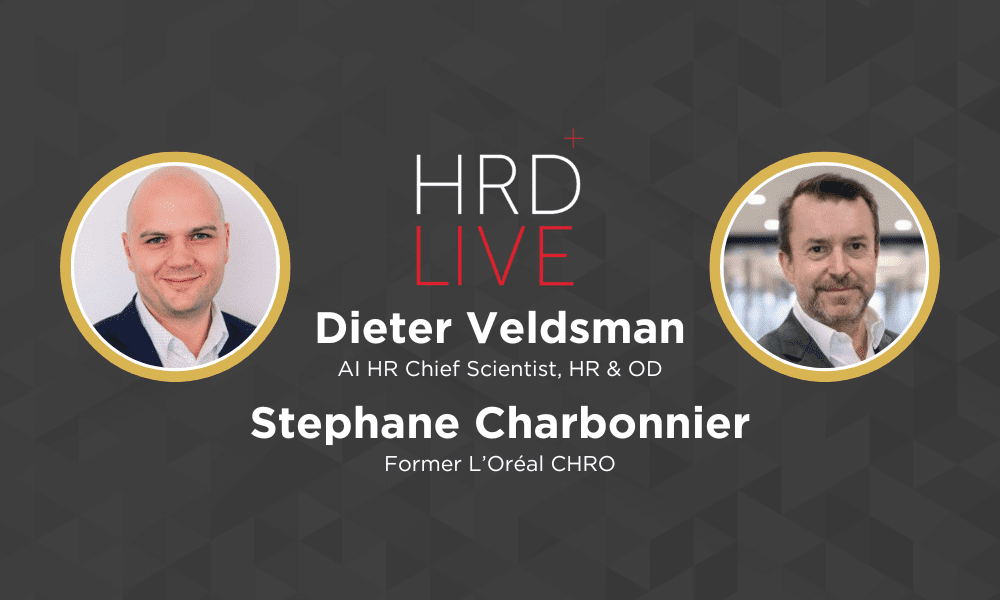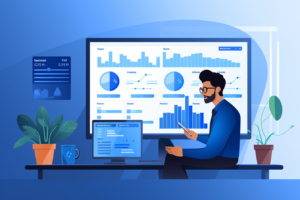Leadership learnings: How to upskill for the future of work
- 4 Min Read
AI HR Chief Scientist for HR & OD, Dieter Veldsman, and former L’Oréal CHRO Stephane Charbonnier discuss how HR leaders can upskill for the future of work, from developing a digital mindset to strategically conducting the workforce
- Author: Benjamin Broomfield
- Date published: Jul 19, 2023
- Categories

Podcast: Play in new window | Download
Subscribe: RSS
The rapidly changing landscape for work is shifting the requirements for leaders at all levels of the business. The role of the CHRO is evolving to become more data-driven and strategic than ever before. HR leaders must seize a unique opportunity for greater strategic input, and to do so must develop their digital literacy. In the first episode of the HRD Live Podcast series on the Future of Work, we are joined by AI HR Chief Scientist for HR & OD, Dieter Veldsman, and former L’Oréal CHRO Stephane Charbonnier, to discuss the evolving CHRO skillset and the leadership learnings for current HR Leaders.
Leadership learnings: Becoming a ‘conductor’
The role of the CHRO, argues Charbonnier, has become that of an orchestra conductor. “Not long ago, the head of HR had the role of an expert,” he explains. “The role of co-ordination, prepping for the future, and fostering greater collaboration in the company between different functions was the role of the CFO or CEO.”
CHROs and HR leaders are now responsible for this type of work: Co-ordinating dialogues, anticipating future challenges and becoming closer to the business. Veldsman builds on the metaphor, comparing the use of data to the sheet music a conductor draws from. “How do I connect the people data I am seeing to the priorities of the business?” he asks. “And how do I coordinate these different parts to bring the right conversations to the executive table?”
Veldsman emphasizes the need not just for driving data literacy as a part of an HR Leader’s skill set, but also to develop an evidence-based mindset; to stick closely to the sheet music to create a symphony of insight. By doing so, HR leaders can continue to change the expectations that surround HR and add further strategic value.
Leadership learnings: The digital, data-driven skillset and mindset
Both Charbonnier and Veldsman also have plenty of advice for developing the skillset and mindset detailed above. Charbonnier is keen to point out the need for curiosity. “Go and find out what’s happening outside of your company, throughout the industry,” he says.
“The key word is curiosity,” agrees Veldsman. “An openness to experimenting, finding new ways of thinking, and adopting new practices.” He emphasizes the need for today’s HR leaders to ask why they want this role, and what motivation sits behind their ambitions. This journey of self-discovery will help leaders to understand exactly what skills will get them to this role, from business acumen to data literacy.
Listen to the full episode to hear Charbonnier and Veldsman discuss the changing role of the CHRO, how HR leaders can develop data-driven productivity with human-centric and ethical work cultures, and much more.
Timestamps
00:10 – Introduction
01:12 – Stephane, how are you expecting the CHRO role to change in the next five years, and what are you doing to prepare?
03:03 – What influence will the shift to data-driven HR have on the CHRO role in the future?
09:15 – What steps can current HR Directors and VPs take to improve their overall digital literacy?
12:40 – Historically we have seen CHROs undervalued as strategic partners at the C-Suite level – does this statement still match reality?
16:34 – How can CHROs bridge the gap between data-driven decision-making and human-centric cultures, to build organizations that are productive, ethical, and sustainable?
21:41 – Are there any other future of work challenges or imperatives you think are important to note?
________________
Stephane Charbonnier was the CHRO at L’Oréal USA at the time of recording. Before joining L’Oréal in 2013, Stephane worked for more than two decades in key HR leadership positions at global organizations including PepsiCo, American Express, and McDonald’s in Europe and the United States.
Dieter Veldsman is Chief Scientist for HR & OD at AIHR. He has an extensive career in Work Psychology and Human Resource Management and more than 15+ years of experience working with organizations in EMEA, APAC, and LATAM, with over 5+ years at an Executive level. He speaks frequently at conferences and panels on strategic HR, OD, and the future of work.








